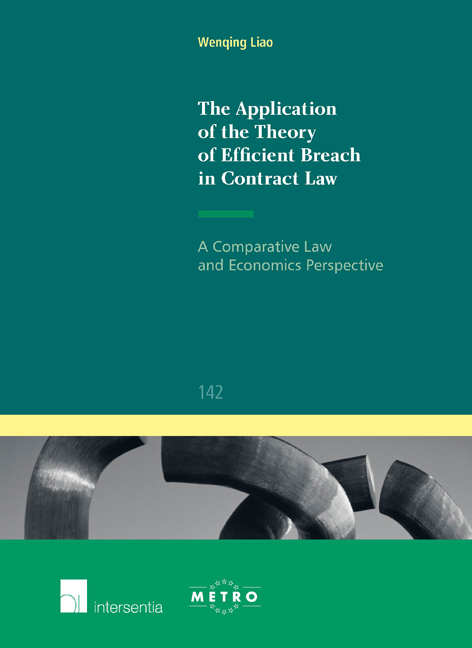 The Application of the Theory of Efficient Breach in Contract Law
The Application of the Theory of Efficient Breach in Contract Law Published online by Cambridge University Press: 12 December 2017
As China is becoming more active in the global economic market, the development of Chinese Law has also gained more and more attention from both policy makers and scholarship. Special emphasis has been placed on the rules in relation to business activities and market regulation. Against this background, this chapter will show how the Chinese sales law motivates a seller to perform contracts as well as to what extent the economic theory of efficient breach is embodied in Chinese law. At the beginning of this chapter, a general introduction to Chinese sales contract will be provided. Afterwards, section 2 will discuss the basic rules on the seller's breach as well as the buyer's remedy. Specific issues such as the Chinese concept of “continuing performance” as well as the rules concerning monetary damages and liquidated damages will be included in section 2. As will be shown, China has established the basic rules on expectation damages in the newly enacted Contract Law (1999) by some provisions similar to those in other civil law legislations and international documents. However, the supplementary rules adopted in judicial practice have modified this type of damages. Application of efficient breach in a specific model will be structured in section 3. In section 4 of this chapter, an economic analysis of remedy rules in Chinese Law will be developed. At the end of this chapter, section 5 will provide a conclusion to the question how Chinese law motivates a seller in a sales contract to perform and breach
Introduction to Chinese Sales Law
Although the law of sales contracts in China is mostly discussed in recent decades, the concept of contract has existed in Chinese civil society for a long time. The concepts of “Agreement” and “Contract” in China have their origins in the ancient term of “Qi Yue”. In the early dynasty of “West Zhou” (1046-771 BCE), “Qi Yue” was used to make an agreement between private parties.
To save this book to your Kindle, first ensure [email protected] is added to your Approved Personal Document E-mail List under your Personal Document Settings on the Manage Your Content and Devices page of your Amazon account. Then enter the ‘name’ part of your Kindle email address below. Find out more about saving to your Kindle.
Note you can select to save to either the @free.kindle.com or @kindle.com variations. ‘@free.kindle.com’ emails are free but can only be saved to your device when it is connected to wi-fi. ‘@kindle.com’ emails can be delivered even when you are not connected to wi-fi, but note that service fees apply.
Find out more about the Kindle Personal Document Service.
To save content items to your account, please confirm that you agree to abide by our usage policies. If this is the first time you use this feature, you will be asked to authorise Cambridge Core to connect with your account. Find out more about saving content to Dropbox.
To save content items to your account, please confirm that you agree to abide by our usage policies. If this is the first time you use this feature, you will be asked to authorise Cambridge Core to connect with your account. Find out more about saving content to Google Drive.